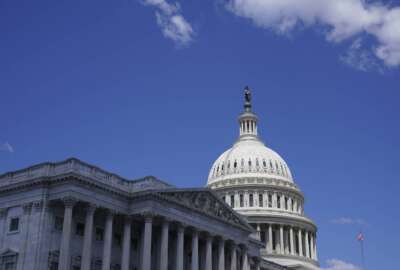
An update on Capitol Hill with WTOP’s Mitchell Miller
After months of back and forth, the legislation that eventually came to be known as the Inflation Reduction Act is a done deal. The House passed the huge reconc...
Best listening experience is on Chrome, Firefox or Safari. Subscribe to Federal Drive’s daily audio interviews on Apple Podcasts or PodcastOne.
After months of back and forth, the legislation that eventually came to be known as the Inflation Reduction Act is a done deal. The House passed the huge reconciliation bill on Friday afternoon on a party line vote. And though it addresses a wide variety of Democrats’ spending priorities over the next decade, Congress still hasn’t dealt with the budget for next year — the fiscal year that starts just a little over six weeks from now. Federal News Network Deputy Editor Jared Serbu talked about the goings-on in Washington, D.C. with Mitchell Miller, WTOP’s Capitol Hill correspondent on the Federal Drive with Tom Temin.
Interview transcript:
Jared Serbu: All right, Mitchell. And obviously, the place to start here is the huge Inflation Reduction Act that has just passed both houses of Congress. Let’s talk about some of the federal impacts here. The obvious place to start is IRS which is just getting a firehose of new money.
Mitchell Miller: Absolutely. This was a topic that was huge during the final debate in the House before it passed, and the IRS is going to get $80 billion, a huge influx. The expansion in this bill is also going to probably fund somewhere on the order of 87,000 new workers. Now that would be over close to a decade. But still, that’s a huge infusion of money. Now, on the political side, Republicans argued this could mean a lot more audits for everyday taxpayers. Democrats say that’s not the intent, though, to raise more money, it is expected to focus on wealthy people, large corporations, partnerships. But as you know, raising money through tougher IRS enforcement has been something talked about a lot by both parties, whether they want to pay for something, or show savings for other initiatives. So this is going to be a big part of this legislation moving forward.
Jared Serbu: And we should say that $80 billion is over 10 years. But it’s still an enormous amount of money. I think it’s right around 5 billion in just the first year, which almost raises the question of can the agency spend that new money that quickly. Was was that raised at all, during the final debate in Congress just issues around the logistics of overseeing this new spending and making sure it’s spent effectively?
Mitchell Miller: Absolutely, there’s going to be a lot of concern about whether or not this money is spent correctly and efficiently. Republicans have already indicated, you know, if they win in the midterm elections, which there’s a very good chance they could in the House, you can expect a lot of very close oversight over this kind of spending, because many of these federal agencies, as you’re aware, get the money and then it gets very slowly doled out over time. And they really want to, Democrats at least, want this to start really raising money that the enforcement really takes place. So also because the IRS has had so many problems with the backlog of paperwork and trying to transition to various technologies. There is a real concern here among members of Congress that this money, because it is such a huge amount, that it is spent in an efficient way.
Jared Serbu: A lot more going on in this bill than just IRS. What else should we be watching in the federal space for implementation here?
Mitchell Miller: Well, in terms of the federal space, Medicare is really the big one in terms of health care, Medicare, being able to negotiate prescription drug prices. This is something that Democrats particularly have sought for years, but also some Republicans knowing that it has always polled well. Initially, Medicare will only be able to negotiate for 10 different medicines. But that will ultimately expand. Also important to note, this change won’t go into effect right away, much as many Democrats would like you to believe it’s coming right around the corner, it’s not actually going to take place until 2026. Now other provisions are going to take place sooner. By the way, this would also cap annual prescription drug costs at $2,000 a yea. Again, all of this affecting people on Medicare, monthly Medicare costs for insulin would be capped at $35. People probably remember hearing about the Senate debate over that issue, a provision to put that cap into place for those with private insurance was blocked by Senate Republicans. But certainly there’s going to be a lot of things that are going to have to be taken care of within Medicare because these are some very significant changes, as I mentioned, really decades in the making in some cases.
Jared Serbu: And meanwhile Postal Service getting some money here at the same time their unions are saying that they really need some more people right now, I don’t think this bill is going to handle the people issue but definitely some additional postal spending. Right?
Mitchell Miller: Absolutely. So this will be handling things on the equipment side for sure. The Postal Service is going to get about $3 billion to purchase more electric vehicles in its fleet. Now the Postal Service has had these gas powered vehicles for more than three decades. People on both sides of the aisle, as well as observers of Congress all agree that they need to be replaced or updated. And some lawmakers have said that the Postal Service has been moving too slowly to try to adopt electric vehicles which of course would also cut down on emissions, cut down on costs over time, with such high gas prices. But initially, the Postal Service only committed to purchase about 10% of its new fleet in connection with this big overall ramp up of plans that were outlined. And then they kept getting pressured to put that up. So eventually they got it up to close to about 40%. Basically, what this now it says is they have the money upfront to actually get these electric vehicles. Now we’ll have to see what the Postal Service actually does, and how long that is going to take place. And then, as you mentioned, the Postal Service unions say the Postal Service still isn’t hiring enough people, they don’t have enough people to do the job. So the two largest unions have been weighing in the National Association of Letter Carriers and the American Postal Workers Union, calling for more hiring. Basically, they say that this chronic understaffing is really taking a toll on morale. Now, the Postal Service has said in its own defense, that it’s converted a lot of these part time jobs, as many as 100,000, into full time jobs. But the unions say there’s just still not enough people and enough money to get all of these people to do the work that needs to be done by the Postal Service.
Jared Serbu: And Mitchell, before we let you go, despite Congress having passed this giant 10 year spending package, they still have not gotten around to funding regular appropriations for 2023. Not a whole lot of legislative days left between now and the end of the fiscal year. It’s safe to say the question at this point is really just how long a continuing resolution lasts rather than will there be a continuing resolution?
Mitchell Miller: Exactly. I mean, there’s no doubt that there will be a continuing resolution. And as is often in the case, especially in the last decade, really, it is a matter of how long is it going to be? You know, some people want to do a very short one. Other people say, well, we need to really extend it as far as we can into the new year, especially given the fact that you have the midterm elections potentially complicating a lot of things in the next couple of months. So we’ll have to see exactly how long, I think we’re going to have a little back and forth, as we usually do on that. It’s interesting that amid all these other pieces of legislation that have been passed and signed by Congress, it’s interesting that the federal budget has actually been sort of under the radar. The House actually did pass in July, a package of six fiscal year spending bills, you know, covering things like Transportation, [Department of Housing and Urban Development], Agriculture, [Food and Drug Administration], Interior and Veterans Affairs. But of course, with no action in the Senate, they just can’t go anywhere. And then they still have, of course, six other appropriation bills to be handled. So clearly, we’re going to familiar déjà vu all over again, as Yogi Berra would say, with the continuing resolution, it’s just a matter of how long as you say it’s actually going to last.
Jared Serbu: All right, WTOP’s Mitchell Miller joining us from Capitol Hill. Thanks, Mitchell.
Mitchell Miller: All right. Thank you very much.
Copyright © 2024 Federal News Network. All rights reserved. This website is not intended for users located within the European Economic Area.
Tom Temin is host of the Federal Drive and has been providing insight on federal technology and management issues for more than 30 years.
Follow @tteminWFED




